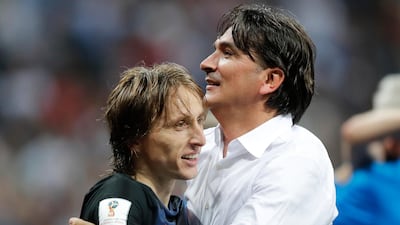“The easy way out would have been to stay on the half-way line and say ‘I missed one, I’d rather not [take another]’ and everyone would have said ‘that’s fine, that’s acceptable’.
"But that’s not what sport’s about; it’s not what football’s about; it’s not what life’s about.”
The words were Stuart Pearce’s, reflecting in a recent documentary about volunteering to take a penalty when he was defined by a famous miss.
Six years separated the spot kick the England left-back drilled against Bodo Illgner’s legs in the 1990 semi-final shoot-out and the one he converted, to a cathartic celebration, against Spain in Euro 96.
There were only four minutes of football between the penalty Kasper Schmeichel saved from Luka Modric in Denmark’s last-16 meeting with Croatia and the subsequent shoot-out.
_____________
Read more
Extra Time podcast: Comeback kings Croatia to come up short against Mbappe
Richard Jolly: Mbappe's chance to confirm himself as heir to Messi and Ronaldo's throne
2018 World Cup final predictions: will it be France or Croatia who lift the trophy?
Resolve of Zlatko Dalic's comeback kings Croatia earn them World Cup final place
Exclusive: Croatia manager Zlatko Dalic on his side's 'fantastic' World Cup run
_____________
Modric stood up again and, if not entirely convincingly, converted. He scored again in the quarter-final shoot-out against Russia.
Talk of character and a ferocious tackler like Pearce, with thighs the size of a small country, may spring to mind.
Modric may have the slender frame of a 12-year-old boy but he has demonstrated his determination, scoring healing penalties, playing incisive passes, running midfields and running himself into the ground. He has been craftsman and warrior.
“When you see him sprinting after 115 minutes to retrieve a ball, it shows his desire,” said manager Zlatko Dalic.
And that was before the semi-final against England, where Modric could barely move when he was eventually substituted, but he turned the game by dictating it.
He will do something that even Zvonimir Boban, whose status as Croatia’s greatest ever captain was cemented in the 1998 tournament and went unquestioned until now, never did by captaining them in a World Cup final.
Perhaps a quadruple Uefa Champions League winner has reached new heights. “He is playing the best football of his life,” said Dalic this week.
No one in the World Cup final has completed more passes or created more chances than Modric.
Few have as many defining contributions: the rifled goal against Argentina, the inch-perfect pass to release Ante Rebic when he won the penalty against Denmark, the spot kicks he scored in successive shoot-outs.
If assessing Modric can be complicated, so is his relationship with penalties. A decade ago, a hugely gifted Croatia team lost a Euro 2008 quarter-final to Turkey when Modric and Ivan Rakitic, along with Mladen Petric, missed from 12 yards.
Ten years later, the two midfielders have scored in both shoot-outs.
And yet the redemptive narrative is complicated by the reality that Modric faces a perjury charge in his own country that could carry a five-year jail term for his testimony in the trial of the former Dinamo Zagreb director Zdravko Mamic.
The prospect of a World Cup-winning captain being sent to prison seems unlikely. Yet much is improbable about Croatia’s story, as a country of just 4.1 million bid to beat the footballing and demographic odds by emerging triumphant.
Along the way, Modric is becoming the centre of attention. He is already part of the first side since Bayern Munich in the 1970s to win three consecutive European Cups, but Cristiano Ronaldo showed a propensity to overshadow everyone else at Real Madrid.
Modric and Rakitic had seemed Croatia’s version of Steven Gerrard and Frank Lampard, excellent individually but incompatible.
Now they may instead be their Xavi and Andres Iniesta, likeminded passers who conquer the world with an ethos. Yet it is not just technical talent that has taken Modric this far.
He has embodied a side who have gone behind in each of their three knockout games and recovered to progress, twice on penalties.
It has been a triumph of character. His, in particular.


